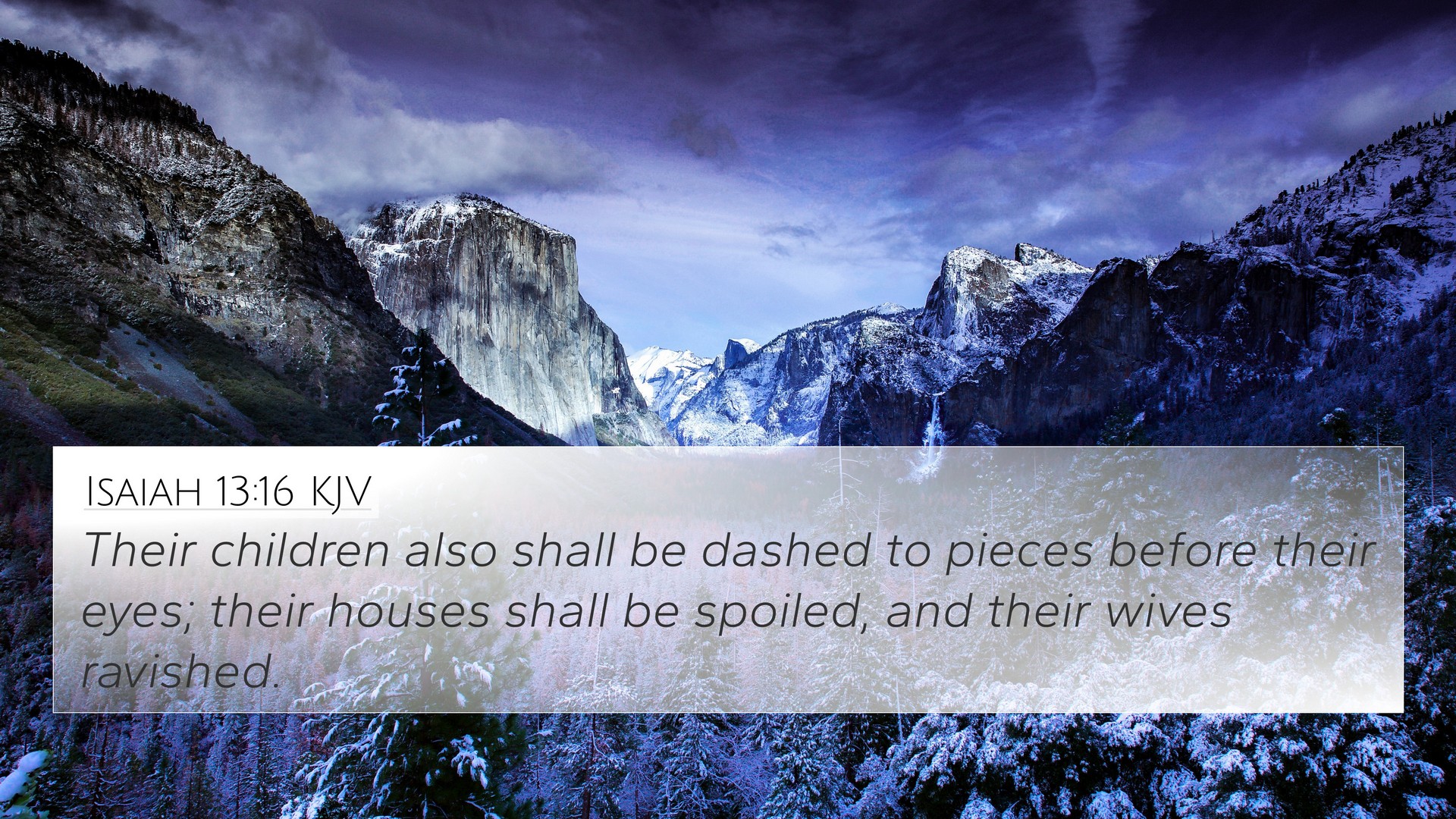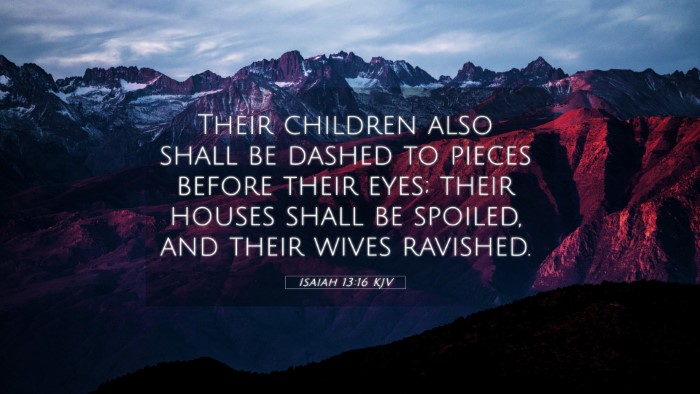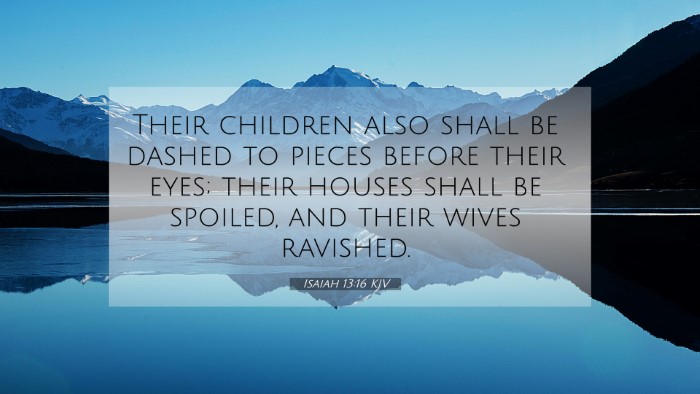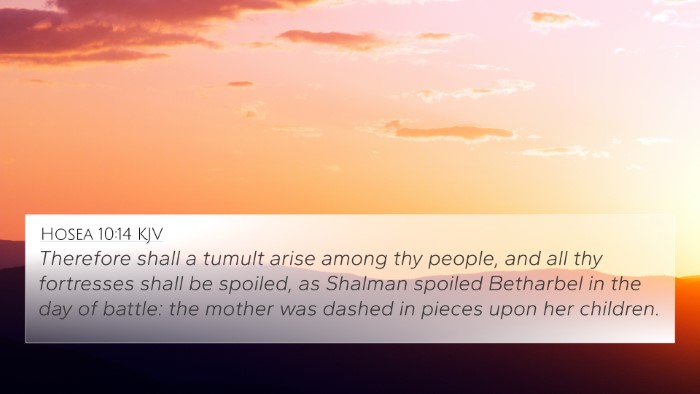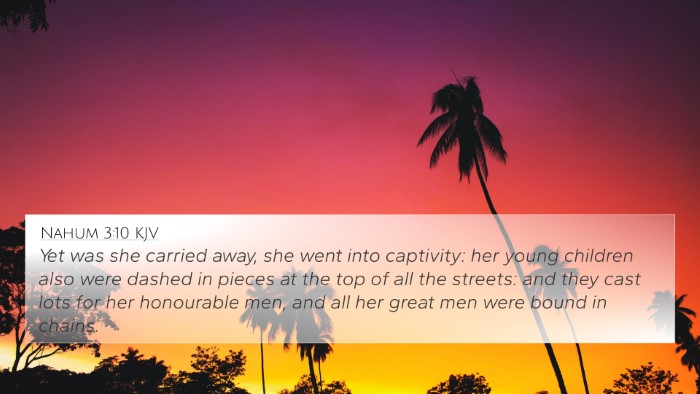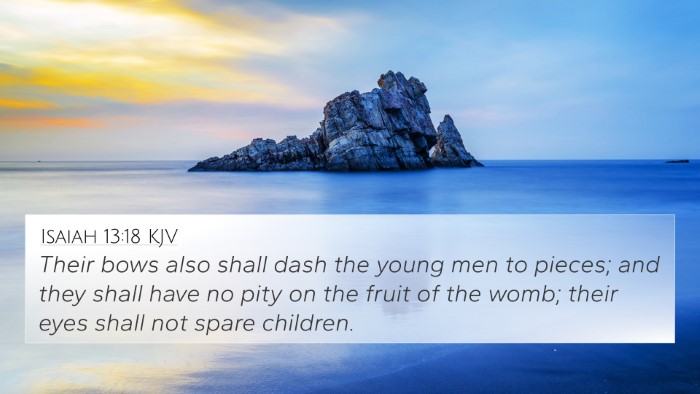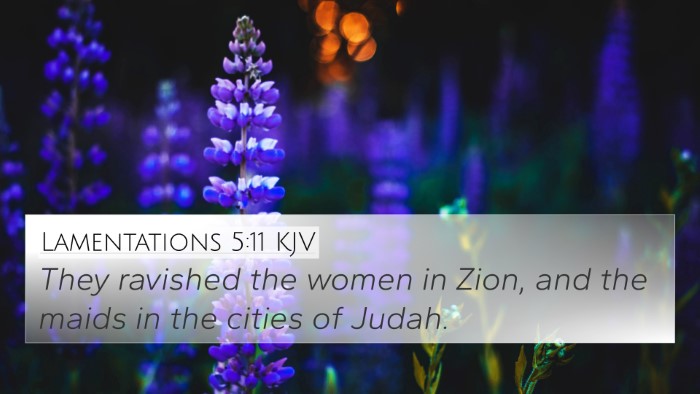Understanding Isaiah 13:16
Isaiah 13:16 states: "Their children also shall be dashed to pieces before their eyes; their houses shall be spoiled, and their wives ravished." This verse is a somber depiction of the consequences of divine judgment against Babylon. The historical context of this prophecy reveals a grim picture of the fate that awaits those who stand opposed to God’s will and His people.
Contextual Background
The book of Isaiah, written by the prophet Isaiah, contains prophecies concerning nations, specifically focusing on God's judgment. Isaiah 13 outlines the impending doom of Babylon, which symbolizes pride, rebellion, and oppression against Israel.
Commentary Insights
- Matthew Henry: He highlights that this judgment serves as a warning. The destruction of families and the devastating fate of the populace reflects the seriousness of turning away from God. It emphasizes the horrors that accompany divine retribution.
- Albert Barnes: He explains that the imagery of violence against children illustrates the totality of destruction that Babylon would face. Barnes stresses that such a fate underscores the comprehensive nature of God’s judgment; when a nation is condemned, no segment of society is exempt from the consequence.
- Adam Clarke: Clarke elaborates on the emotional distress depicted in this verse. The emphasis on children being dashed to pieces underscores the brutal reality of war and its indiscriminate nature, serving as a dire reminder of what is at stake in spiritual rebellion.
Bible Cross-References
Isaiah 13:16 can be connected with several other scriptures that depict the theme of divine judgment and the consequences of sin:
- Psalms 137:9: "Blessed shall he be who takes your little ones and dashes them against the rock!" - This verse also reflects the reality of vengeance and God’s judgment against oppressors.
- Jeremiah 50:21: “Go up against the land of Merathaim, and against it, even against the inhabitants of Pekod: waste and utterly destroy after them, saith the LORD, and do according to all that I have commanded thee.” - This reflects similar themes of destruction and judgment.
- Ezekiel 9:6: “Slay utterly old and young, both maids, and little children, and women: but come not near any man upon whom is the mark; and begin at my sanctuary.” - This echoes the totality of judgment upon rebellious populations.
- Zechariah 14:2: "For I will gather all nations against Jerusalem to battle; and the city shall be taken, and the houses rifled, and the women ravished..." - This expresses the divine actions during times of judgment.
- Matthew 24:19: “And woe unto them that are with child, and to them that give suck in those days!” - Here, Jesus references similar calamities that will befall during tribulation, highlighting the terror affecting families.
- Revelation 18:21: "And a mighty angel took up a stone like a great millstone, and cast it into the sea, saying, Thus with violence shall that great city Babylon be thrown down..." - This reveals the complete and violent fallout of God’s judgment against Babylon symbolically representing sin.
- Isaiah 14:21: “Prepare a slaughter for his children for the iniquity of their fathers...” - Here, the consequences of previous generations’ sins also impact their descendants, reinforcing themes found in Isaiah 13:16.
Thematic Connections
Isaiah 13:16 is part of a broader biblical narrative concerning divine justice. The themes of judgment, oppression, and the vulnerability of families under the weight of sin are recurrent throughout both the Old and New Testaments. Here are some thematic connections:
- God’s Justice: The theme of reaping what one sows is prevalent throughout scripture.
- Prophecy of Destruction: Prophetic books often signal impending doom for nations that turn against God.
- Divine Warning: Many scriptures serve as warnings to nations and individuals about the consequences of sin.
- Importance of Family: The suffering of families highlights a societal breakdown during times of national sin.
Conclusion
Isaiah 13:16 offers a poignant reminder of the reality of divine judgment. The insights derived from various public domain commentaries allow for a deeper understanding and reflection on the weight of God’s words throughout scripture. By examining cross-references, one gains a broader view of how this verse connects to the overarching narrative of God’s plan as revealed through biblical texts.
Related Studies: Readers are encouraged to explore comprehensive Bible cross-reference materials and consider utilizing tools for Bible cross-referencing to deepen their understanding of how verses interconnect within the biblical narrative.
